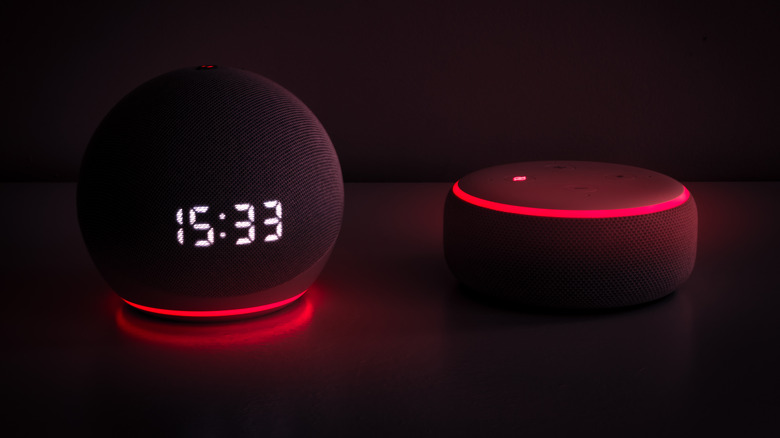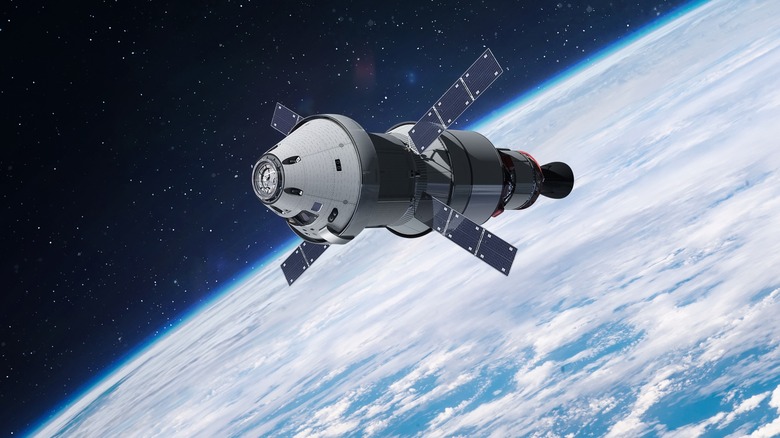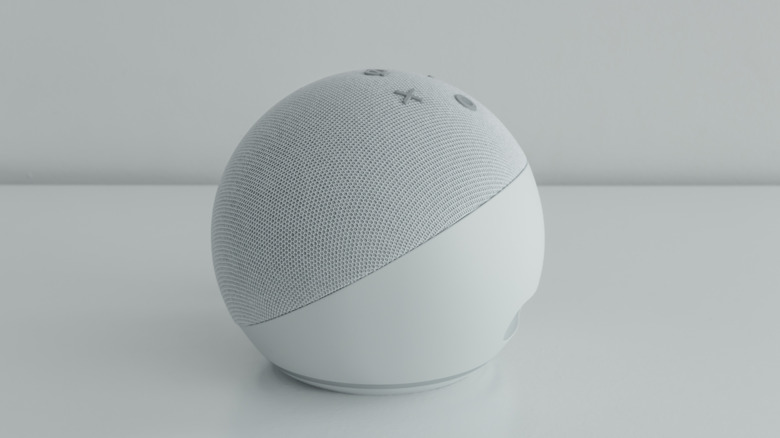Getting Amazon's Alexa To The Moon Was No Easy Feat
Artemis I was launched successfully on November 16. The mission, which is designed to test out the capabilities of NASA's Orion spacecraft, was unmanned, although there was one notable non-human passenger on board. A version of the popular smart home assistant Alexa is currently hurtling towards the moon — but getting her up there was no easy feat.
NASA's Artemis program is an ambitious set of missions aimed at taking humans back to the moon for the first time in over 50 years. If all goes to plan, by 2025, not only will a human have set foot on the lunar surface again, but we'll also have the capability to explore earth's largest natural satellite in depth and maybe even go beyond that. NASA plans to establish a permanent base on the moon, allowing astronauts to stay for extended periods. The space agency believes that instead of being limited to a few days, scientists and researchers could spend weeks or even months on the moon before making the journey home. There is also the Gateway project which should result in an ISS-like space station orbiting the moon. The Gateway could be used as a staging point for further lunar exploration, a resupply point for humans heading to Mars, and could even be the first stop astronauts make before they head off to explore deeper into space.
All of this involves lots of cutting-edge technology and an eye-watering budget. The space suits astronauts will make the journey in cost around half a million dollars each, and developing them costs close to half a billion. But you can experience some of the technology that the Artemis missions will use yourself, and you may already own a device that relies on it. Though, space Alexa is a bit different from the standard version.
Alexa faces some unique challenges beyond Earth
The version of Alexa currently hurtling towards the moon is a bit different from the one that's responsible for turning your bedroom lights on and reeling off your Spotify playlist, though some features do overlap. For a start, Orion doesn't have internet access, so all of Space Alexa's features have to be built in. The one on your bedside table is reliant on the cloud, as you'll see if you disconnect it from your WiFi and ask it to do anything at all. NASA does have ways of communicating with its spacecraft, including Orion, and this could be used to link the space-bound version of Alexa with Amazon's servers — but communications would take so long that features like Alexa would be all but useless.
It's also not in a form you would recognize. You can't just plug an Echo Dot in and stick it to Orion's dashboard. Instead, it's a part of "Callisto," a briefcase-sized unit that has been developed by Amazon, Lockheed Martin, and Cisco. During Artemis I, Callisto will be used to test out video and voice assistant technology which could prove useful in future missions. Unlike standard Amazon devices, Callisto is designed to endure the unique stresses space travel inflicts on people and objects, including radiation levels that would cause issues for an average echo dot. Then there are other factors to consider, like how cabin acoustics will affect voice commands, and the specific vibrations the spacecraft will have to endure on its journey (via Fast Company).
Some of Alexa's features that will carry into space
Then there is practicality. While onboard Orion, Alexa will actually have a lot of the same features it has on earth, and won't have as much control of the ship as you may initially think. As anyone who uses Alexa or any other home assistant knows, it doesn't always get things right. While asking it to turn your TV on and having your lights go off instead is annoying on earth, a voice-assistant-related mix-up in space could be catastrophic. So rather than risking "set engines to 50%" being interpreted as "set course for the sun and jettison all of the food supplies," Alexa has been firmly kept away from mission-critical activities. However, the voice assistant will be useful in many ways and some of its features overlap with a regular Alexa's.
For instance, Alexa can control some lights on the Orion spacecraft and can play a selection of the astronauts' favorite music. It can even tell corny jokes. Timers and alarms can be set, and it will also be able to relay information, much like it does on earth. However, the questions may be different and more pertinent to the mission. Alexa can relay things like the spacecraft's speed and distance from the moon, and search for procedures to help astronauts troubleshoot. "We're thinking about situations when people are buckled into a chair, have gloves on, or are otherwise engaged in some task but still want access to information or to be able to control some sort of device with their voice," said Amazon's Aaron Rubenson.
Space Alexa may trickle down to the Earth versions
As Alexa can't rely on the cloud as it is hurtling through the void, a lot of focus was placed on making it as self-sufficient as possible. According to The Verge, the version of Alexa currently on Orion can process commands in milliseconds — and that level of functionality may soon grace Alexa-enabled devices here on Earth. This would be incredibly useful for most smart home users. In addition to the added speed, the local-level self-sufficiency could be huge. If your internet goes down, your smart speakers will lose a good portion of their functionality.
A localized Alexa that could operate without being connected to the internet would also be massive in privacy terms. Alexa, and similar devices, have been dogged by privacy concerns for years. If users had the option to disable their smart speaker's ability to relay things back to Amazon HQ, more people may be comfortable bringing Alexa into the house. In the future, and partially thanks to the work Amazon has done with the Artemis program, you could have a faster, more reliable, and more secure version of Alexa managing your home. Until then, you can still interact with the spacefaring version. Saying "Alexa, take me to the moon" gives you an update on Alexa's mission, along with other facts about Artemis I.


